
Kike (
Key-kay) gave me Mexico tied up in a red, white and green bow.
He gave me all of Mexico's exotic foods, its popular customs, all its cumbia, hip hop, ska, reggae music, its current events, all of Mexico's pride. Kike gave me
futbol. He didn't give me soccer. He gave me
futbol Mexicano, the stats,
la porra. He made a fan out of me, made me a Jaguar, made me bleed orange. He tamed Mexico City, big, bad Day eFay, the beast, he tamed it right in front of my eyes giving it to me so I could make it my own. Kike made a wife out of me, his
esposa, and with that he gave me a whole family: a
suegra, mother-in-law, her food, her rules, her grandkids, and her only son. He gave me a life in Spanish, a life dubbed in street Spanish with dictionary Spanish subtitles. Kike would spoon me every night as we fell asleep and every morning as we woke up. He would cuddle me and give me all the energy, all the experience and all the love he knew how to give.
I have tears in my eyes at this very moment, knowing and having to admit that after all Kike had given me...it just wasn't enough. So, if this book were especially dedicated to any one person in particular, it would have to be Kike.
To Kike,
Key-kay, Enrique,
el Negro: for giving me everything you had to give and for showing me Mexico.










